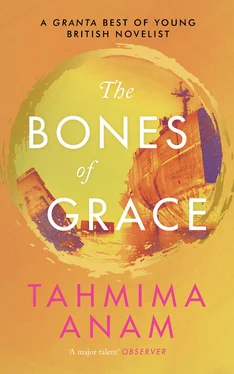In Calcutta, Dolly got us rooms with connecting doors at the Grand, and I could hear them talking and giggling while I watched reruns of MasterChef Australia . We sat on velvet stools at fancy boutiques and were shown one sari after another, while the word ‘trousseau’ was whispered among the salesmen. Later, over ice cream, they told me that at university they had one fancy sari between them, borrowing it from each other for special occasions. Of course, the sari was Dolly’s — Ammoo couldn’t afford such luxuries — but that isn’t how they remembered it. I guess that is why, after so many years, they were still best friends. Ammoo had risen to the top of her profession — people addressed her as ‘respected Apa’ — and Dolly, in the meantime, had become a rich man’s wife, nothing but the accomplishments of her children to brag about. Ammoo reminded Dolly of the women they had expected themselves to become, back when the war made their dreams expand out of their little lives, and Dolly was the loyal friend who had seen her through a revolution and its aftermath. I finally understood why they were inseparable, why they had been plotting for years to bring me and Rashid together, because together they formed a single set of hopes, and that is why I had to accept the plot so faithfully, why, in my mind, there seemed no alternative. It wasn’t so much doing what was expected of me, like Chandana’s Tam-Bram marriage. For this was no arbitrary match, it was the culmination of decades of dreaming, an erasure of history as much as a mark of victory, and in its shadow, I was insignificant.
When Rashid and I were in high school his older sister Ruby sometimes helped me sneak into their house, leaving the downstairs door open and ushering me through the unlit corridors to his bedroom. By the time we got engaged, she had changed her mind. I suppose she had calculated the precise number of handsome, rich, decent bachelors in Dhaka and decided her brother, who had never crashed his daddy’s car or spent a fortune on drugs or gambling, was too good for an old love.
Ruby had a tattoo of a camel on her left breast and dressed like she owned the whole world. She once wore pink cowboy boots under her sari. It was Eid and she propped her feet on the coffee table at her house and showed them off, knee-high, heavily embroidered, and with pointy toes that looked like they could commit murder. After college she had married a weak-chinned American and settled down in New York City, coming home on two-week holidays to distribute lavish presents to the entire family. As soon as the wedding date was set, she booked her flight and started emailing me photographs of the sequined saris and lehngas she wanted to order from a Pakistani designer who lived in her co-op. I was never going to wear a lehnga, and this sparked a polite, cool correspondence between us, with Rashid acting as mediator. He always took my side, at least in private, and found a way to get me what I wanted without letting Ruby know she was being turned down. He was expert at this sort of diplomacy, and when I expressed annoyance at his unwillingness to get into a fight with his sister, he would say, ‘Isn’t it better this way? You got your sari, didn’t you?’
Ruby arrived the week before the wedding and we decided to surprise her at the airport. When she came through the gates the first thing she said was, ‘There isn’t going to be enough room for my luggage.’ She smiled and shrugged at the same time, tilting her head to the side, and Rashid put his arms around her and lifted her off the ground. Her hair appeared to be recently blow-dried, and I was reminded of the time she told me she never washed her hair in winter except at the salon. Rashid had had the driver bring a second car, so there was, in fact, enough space for Ruby’s luggage, which followed her out of the airport in three carts. ‘I had to get all the things for your trousseau,’ she said, shrug-smiling, ‘you lucky thing.’
Ruby sat in the front with Rashid. ‘How’s Matt?’ I asked, leaning into the air conditioning from the back.
‘Oh, he’s fine. He’s bringing the kids in a few weeks. I can’t stand being on a plane with them.’ She turned around and winked at me. Then she put her hand on Rashid’s knee and said, ‘Little brother! Never thought you’d actually do it. How are the parents? Is Mummy having a fit?’
‘She’s driving everyone crazy.’
‘Bet she forgot to make my favourites for lunch.’ She twisted around again. ‘See? You’re already ruining my life.’
I was hoping Rashid would offer to drop me off at home, but he drove straight to his house and I stood by awkwardly while Dolly and Bulbul and Rashid and Ruby and Junaid, who was home from boarding school, all hugged and said how good everyone looked, despite the tension of the upcoming wedding. They ordered tea in the garden. ‘Now I can relax,’ Dolly announced, leaning back on a rattan chair. ‘Your father is completely useless and the servants are outdoing themselves with stupidity.’ They exchanged complaints about the staff while Bulbul nodded off, dropping his newspaper onto the grass. Junaid’s phone beeped and he stood up to answer it, nodding briefly at me and loping off.
I was wondering if anyone would notice if I slipped away when Ruby rolled out one of her suitcases. ‘Don’t look!’ she barked. ‘I’m just going to give you a preview. Just one.’ She handed me a shoebox. I peeled off the lid and separated the tissue. ‘Don’t you just love them?’ Ruby said.
Dolly picked up the lid. ‘Ferragamo? Sweetie, you shouldn’t have.’
The stilettos were gold and bronze, with a thin strap across the toes and another around the ankle. ‘Thank you,’ I said, pulling one out. ‘They’re beautiful.’
‘You hate them,’ Ruby said.
‘Oh, no, not at all, they look — very weddingy.’
‘That’s exactly what I was thinking, it’s so hard to find designer shoes that work for our clothes. Ammoo and I are always complaining when we shop in New York.’
‘Very right,’ Dolly said.
‘But if you don’t like them, you should just say. We’re sisters now, after all.’
‘Oh, no, they’re great. I just — you know I’m not used to wearing high heels, so I might have a little trouble walking.’
Ruby nodded enthusiastically. ‘I knew you would say that.’
‘You’re so simple,’ Dolly said.
‘But anyway at the wedding you won’t be running around, you’ll just be sitting there, so it won’t matter.’
‘That’s true,’ I said.
Ruby used both hands to place the shoe in its box. I stood up. ‘I should let you rest, Ruby,’ I said.
‘Oh, I don’t have time to rest,’ Ruby said. ‘We’re going to talk to the biryani guy today, aren’t we, Mummy?’
Dolly rubbed her eyes. Rashid was looking down at his phone and frowning. ‘Daddy, did you hear about the strike?’ Bulbul shook himself awake and they leaned over the phone together.
I took my leave, kissing everyone on the cheek. ‘We have to go to the parlour,’ Ruby said to me, ‘those eyebrows need gardening.’
On my wedding day, I thought of Rokeya Sakhawat Hossain, who had written a novel, Sultana’s Dream , about a world in which men and women changed places. It was 1905, and Rokeya was waiting for her husband to return from a business trip, and to impress him with her command of English (which he had taught her), she wrote a short novel. Because in Rokeya’s real world, women wore veils and lived sequestered lives, in her imaginary world, it was the men who were trapped, the men who were locked away. The women, led by a benevolent Queen, ruled using science, technology and the wisdom that comes from having something that is hard won.
Rokeya’s story made me think this: how many novels were written to impress a beloved? And: how did she, trapped in her zenana, push her eye to that better place and see all that would someday come to be, and imagine the things we would never have? Rokeya was my mother’s hero. She dropped her name like other people invoked Jesus or Allah. If Rokeya could do it, she said, so could we. Begum Rokeya had done so much with so little. She championed the education of women, started a school, went from village to village to recruit students, gave speeches in parliament, fought her dead husband’s family over her inheritance, and cracked jokes at dinner parties. And she was a widow, having lost that husband early in life. Perhaps Rokeya reminded my mother of her own mother, also a widow, also from that generation when things like going to school weren’t taken for granted. Now, on the wedding dais, I thought of Rokeya, of my mother, and her mother, and all the women who had done what their mothers had told them to do, and those who had flipped the world around, making prisons into meadows.
Читать дальше












